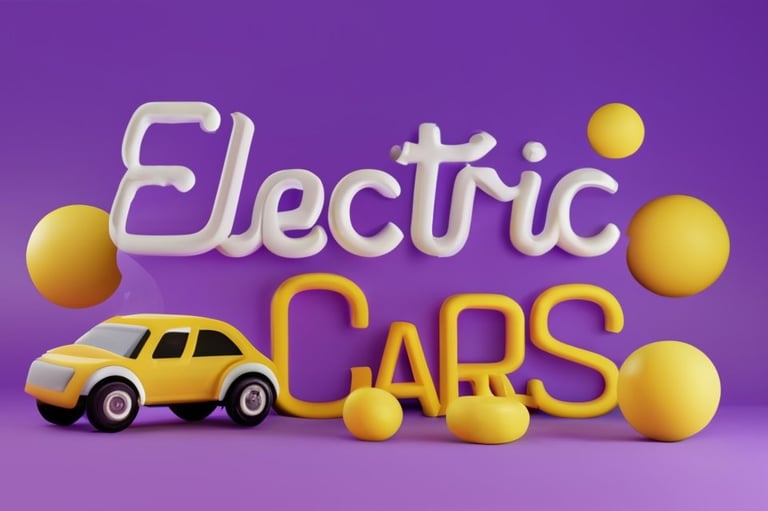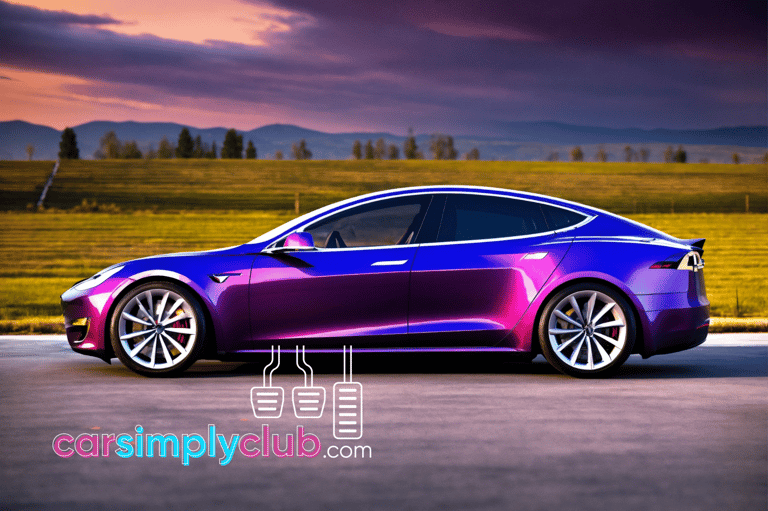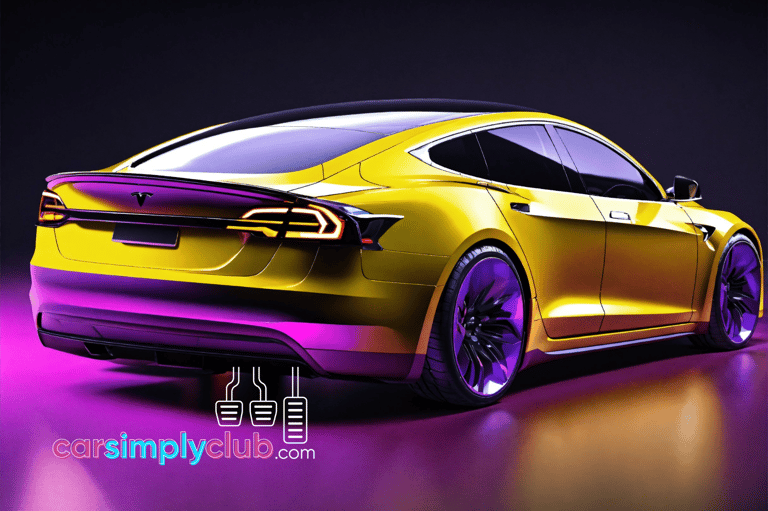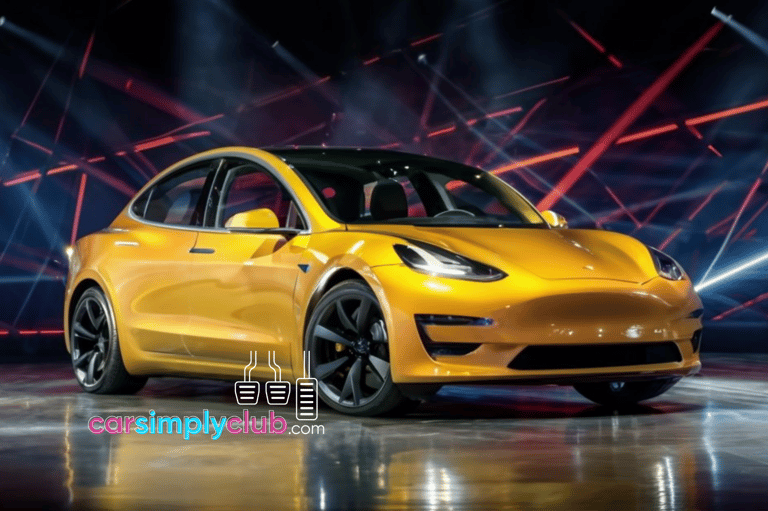Step into the World of Electric Cars
A Journey Through History, Innovators, and Top 5 Best Sellers!
Dive into our blog exploring the world of electric vehicles (E.V.s), unveiling their origins, tech pioneers, and the pros and cons shaping their narrative.
Join us in our Car Simply Club 'Car Fun Facts' series on eco-friendly mobility, unlocking insights into challenges and benefits.
Meet the trailblazers – the top 5 best-selling electric cars, steering toward a greener automotive future!


What is an electric car? and, How does it work?
An electric car is an automobile powered by electricity, not gasoline. It operates using an electric motor and a rechargeable battery. When plugged into a charging station, the battery stores electrical energy, which is then used to propel the car's wheels. Unlike traditional cars, electric vehicles produce zero tailpipe emissions, making them environmentally friendly alternatives.
Who invented the electric car technology?
The origins of electric vehicles trace back to the 1800s, an era marked by innovative minds experimenting with this groundbreaking technology. Among these pioneers, Robert Anderson of Scotland crafted an initial crude electric vehicle in the early 1830s, representing a fundamental step in the evolution of electric cars. Gustave Trouvé showcased an electric car with an enhanced Siemens motor at the 1881 Paris International Exhibition of Electricity, indicating progress in the field. In 1884, Thomas Parker in England achieved a significant milestone by creating the first electric car designed for production. Further advancements occurred in Germany in 1888 when Andreas Flocken developed a more sophisticated electric car, resembling modern automobiles. Finally, In the mid-19th century, Thomas Davenport, an American inventor, contributed significantly to electric car technology, creating one of the earliest practical electric vehicles. These inventors collectively shaped the foundations of electric cars, paving the way for future innovations in the automotive industry.


How has electric car technology evolved over time?
Electric car technology has undergone remarkable advancements over the years. From early experiments in the 1800s to the present day, where electric cars boast extended ranges, faster charging times, and cutting-edge battery technology. Innovations in materials and design have made electric vehicles more efficient, accessible, and sustainable, contributing to a greener future for transportation.
What are 3 advantages of electric cars?
Environmental Friendliness
Electric cars contribute significantly to a cleaner environment due to their lack of tailpipe emissions. This means they don't release harmful pollutants into the air, reducing both air pollution and greenhouse gas emissions. This eco-friendly feature is vital in combating climate change and promoting a healthier planet.
Energy Efficiency and Cost Savings
Compared to traditional cars, electric vehicles are highly energy-efficient. They convert a higher percentage of stored energy from the grid to power at the wheels. This efficiency not only reduces our reliance on oil but also lowers fuel costs for consumers. As a result, electric car owners experience substantial savings in the long run, making these vehicles economically practical.
Noise Reduction and Enhanced Driving Experience
Electric cars operate almost silently, making them significantly quieter than traditional vehicles with internal combustion engines. This not only enhances the overall driving experience, providing a smooth and peaceful ride, but it also contributes to reducing noise pollution in urban areas. Quieter streets lead to a more tranquil environment, benefitting both residents and the ecosystem.

What are some disadvantages of an electric car?
Challenges of Electric Cars
Lengthy Recharge Periods
One of the drawbacks of electric cars is their long recharge time. Depending on the battery size and the charging station's power, it can take several hours to fully recharge an electric vehicle. This extended waiting period can inconvenience drivers who are used to the quick refueling of traditional cars.
High Initial Cost
While electric cars are stylish and environmentally friendly, they often come with a higher price tag compared to regular cars. This initial cost includes the advanced battery technology and other specialized components, making electric vehicles a more substantial investment upfront.
Limited Charging Station Availability
Although charging stations are becoming more common, they are not as widespread as gas stations. This limitation can make finding a charging spot challenging, especially in certain areas. The scarcity of charging stations can lead to range anxiety, where drivers worry about running out of battery power before reaching the next available charging point.
Range Issues
Electric cars have a limited driving range before they need to recharge. While advancements in battery technology have improved the range, it remains a concern for some potential buyers. Long journeys may require careful planning to ensure that charging stations are available along the route.
Battery Capacity and Safety Concerns
Over time, electric car batteries can experience a decrease in performance, affecting the vehicle's overall range and efficiency. Additionally, although rare, there have been incidents of electric car batteries catching fire. Safety standards are continually evolving, but these occurrences highlight the need for ongoing advancements in battery technology.
Environmental Impact of Charging Sources
Electric cars are only as green as the electricity used to charge them. If the electricity primarily comes from fossil fuels or other unsustainable sources, the environmental benefits of electric vehicles can be compromised. This situation raises concerns about the overall impact of electric cars on the environment, especially when the source of electricity generation is not environmentally friendly.
Materials Sustainability
The materials used in electric car batteries, if sourced unsustainably or unethically, can contribute to environmental degradation. Ensuring that these materials come from ethical sources is crucial for minimizing the environmental footprint of electric vehicles. Additionally, addressing concerns related to material scarcity is essential for the long-term sustainability of electric cars.
How long will an electric battery last? And why?
Electric Vehicle Range: Exploring the Factors
Battery Size and Capacity
The range an electric vehicle (E.V) can travel on a single charge is greatly influenced by its battery size and capacity. Bigger batteries generally mean a longer range, allowing you to cover more distance before needing to recharge.
Speed and Weather Conditions
The speed you drive and the weather conditions also play vital roles. High speeds and adverse weather, like extreme heat or cold, can increase energy consumption, reducing the overall distance your E.V can travel on one charge.
Terrain and Accessories
Beyond speed and weather, the terrain you drive on matters. Uphill routes can drain the battery faster than flat roads. Additionally, the use of accessories like air conditioning or heating affects energy usage, impacting your E.V's range.
How far can an Electric Vehicle go on a battery?
Average E.V Range
On average, most electric vehicles offer a range of approximately 200 miles (322 km) on a single charge. However, it's crucial to note that this range can vary based on the specific E.V model and driving conditions.


What happens when the E.V battery runs out?
Depleted Battery Consequences
When an electric vehicle (E.V) runs out of battery, it comes to a halt, requiring a recharge before it can operate again. This dependency on electricity underscores the importance of having a reliable charging network.
Challenges When the E.V Battery Runs Out: Navigating Solutions
Backup Power Sources
Certain E.V models, particularly plug-in hybrids, have backup power sources. For instance, these hybrids can switch to their Internal Combustion Engine (ICE) when their battery is depleted. This temporary solution allows the vehicle to continue operating until a charging station is reached.
Challenges in Finding Charging Stations
One significant challenge E.V owners face is the limited availability of charging stations. Finding a charging spot can be challenging due to infrastructure limitations, station availability issues, and compatibility concerns with different E.V models and charging standards.
Introducing "E.V Range Anxiety"
The term "E.V range anxiety" describes the worry among E.V drivers about finding charging spots, akin to the concerns drivers face when running low on fuel. This anxiety highlights the need for a widespread, accessible charging infrastructure to alleviate drivers' concerns and promote the widespread adoption of electric vehicles.
What is the biggest problem with electric cars?
The Biggest Challenge for Electric Cars: Charging Infrastructure Issues
Limited Charging Stations
One of the primary challenges faced by electric vehicle (E.V) owners is the scarcity of charging stations. Finding a compatible and convenient charging spot can be frustrating, especially in areas where charging infrastructure is lacking. This scarcity limits the convenience of owning an E.V.
Plug, Voltage, and Payment Complications
Adding to the complexity, charging stations often have different types of plugs, voltages, and payment methods. This variety can lead to confusion and inconvenience for E.V owners. Standardization in these aspects is crucial to streamline the charging process and make it user-friendly.
What is Range Anxiety?
E.V Range Anxiety
The term "E.V range anxiety" describes the apprehension E.V owners feel about running out of battery before finding a charging station. This worry mirrors the anxiety drivers experience when their fuel gauge hits empty. Addressing this concern requires a widespread and accessible charging network, ensuring E.V owners can confidently travel without the fear of getting stranded due to a depleted battery.
What is the point of buying an electric car?
The Perks of Going Electric: Benefits and Incentives
Eco-Friendly Driving
Owning an electric vehicle (E.V) means contributing to a cleaner environment. E.Vs produce fewer emissions, making them a popular choice among environmentally conscious individuals. Choosing an E.V aligns with the global effort to reduce pollution and combat climate change.
Economic Incentives
Investing in an E.V comes with its financial perks. Many regions offer incentives such as tax credits, rebates, and discounts to promote electric mobility. E.V owners might also enjoy exclusive privileges, like access to special lanes or parking spots, making their daily commute more convenient and cost-effective.
Comfortable and Quiet Rides
Beyond the environmental and economic benefits, E.Vs offer a comfortable and serene driving experience. These vehicles are notably quiet, providing a peaceful atmosphere for passengers and drivers alike. The absence of engine noise enhances the overall driving comfort, making E.Vs a compelling choice for those seeking a serene ride.
Electric Cars vs. Hybrids: Making the Right Choice
Electric Cars: Clean and Efficient
Electric cars (E.Vs) are paving the way for greener transportation. They operate without exhaust emissions, reducing air pollution and greenhouse gases. E.Vs are highly efficient, utilizing electric power to drive the vehicle, making them eco-conscious choices for environmentally aware consumers. Moreover, they offer a remarkably quiet and smooth driving experience, enhancing the overall ride quality.
Hybrid Cars: Balancing Cost and Range
Hybrid cars, on the other hand, present a cost-effective and widely available alternative. They combine an internal combustion engine with an electric motor, allowing for versatility in various driving conditions. Hybrids are known for their longer driving range compared to pure electric cars, making them suitable for individuals with diverse commuting needs. They strike a balance between traditional fuel-based vehicles and the eco-conscious future, catering to a wide range of consumers.
Personal Considerations: Tailoring the Choice
The decision between electric cars and hybrids often boils down to personal preferences and individual needs. Factors such as driving habits, access to charging infrastructure, budget constraints, and environmental concerns influence this choice. Some prioritize the environmental impact and long-term savings offered by E.Vs, while others opt for hybrids, appreciating their availability and flexibility. Understanding these factors helps individuals make informed decisions, ensuring their vehicle aligns with their lifestyle and values.


What are the 5 best selling all electric cars of all times?
Top 5 Best-Selling All-Electric Cars: Leading the Green Revolution
In the fast-paced world of electric vehicles, certain models have captured the hearts of consumers, steering the automotive industry toward a greener future. Let's take a closer look at these trailblazers (at the time of writing this post):
5. Tesla Model Y: Driving Innovation
With approximately 250,000 sales, the Tesla Model Y is making waves as a recent addition to the electric vehicle lineup. Its innovative features and eco-conscious design have swiftly garnered attention, marking it as a promising choice for eco-friendly commuters.
4. Tesla Model S: Where Luxury Meets Sustainability
Boasting around 315,000 sales, the Tesla Model S combines luxury with environmental consciousness. Its sleek design and high-end features have redefined electric cars, offering a stylish and eco-friendly driving experience.
3. Renault Zoe: Popular Choice Among Enthusiasts
The Renault Zoe, with 320,000 sales, has become a favorite among electric car enthusiasts. Its practicality, affordability, and eco-friendly performance have contributed to its popularity, making it a common sight on the roads.
2. Nissan Leaf: Widely Adopted for Sustainability
With approximately 500,000 sales, the Nissan Leaf stands out for its widespread adoption. This electric vehicle has become synonymous with sustainable commuting, symbolizing the shift toward cleaner transportation choices.
1. Tesla Model 3: Global Leader in Electric Mobility
The Tesla Model 3 reigns supreme with a remarkable 1.1 million sales, establishing itself as the most popular electric car globally. Its impressive range, cutting-edge technology, and eco-conscious design have made it a top choice for environmentally aware consumers, driving the electric revolution forward.
Leave a Reply
Your email address will not be published. Required fields are marked *
Join The Club!
Stay informed with Car News and Car Tech updates, and exclusive emails right in your inbox.
